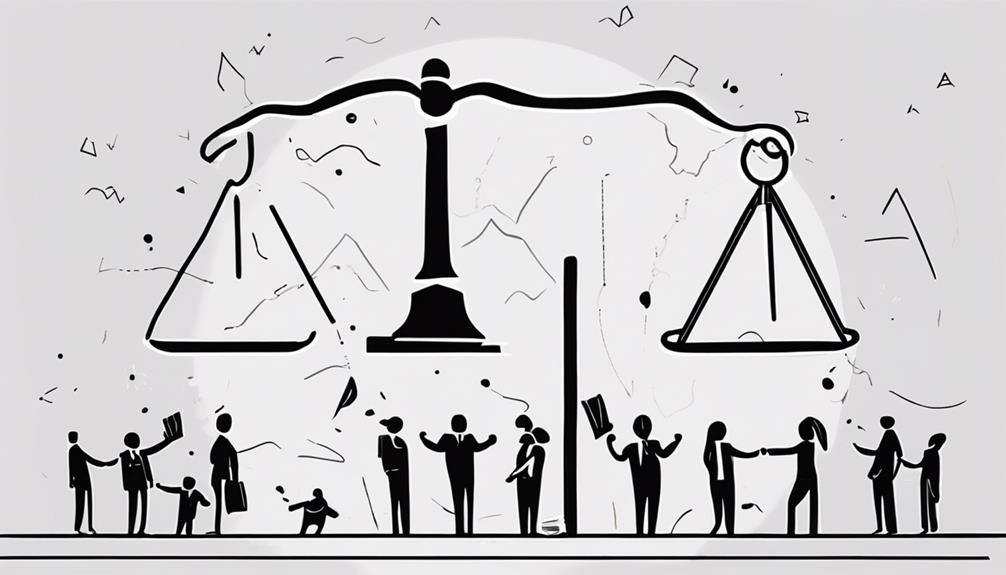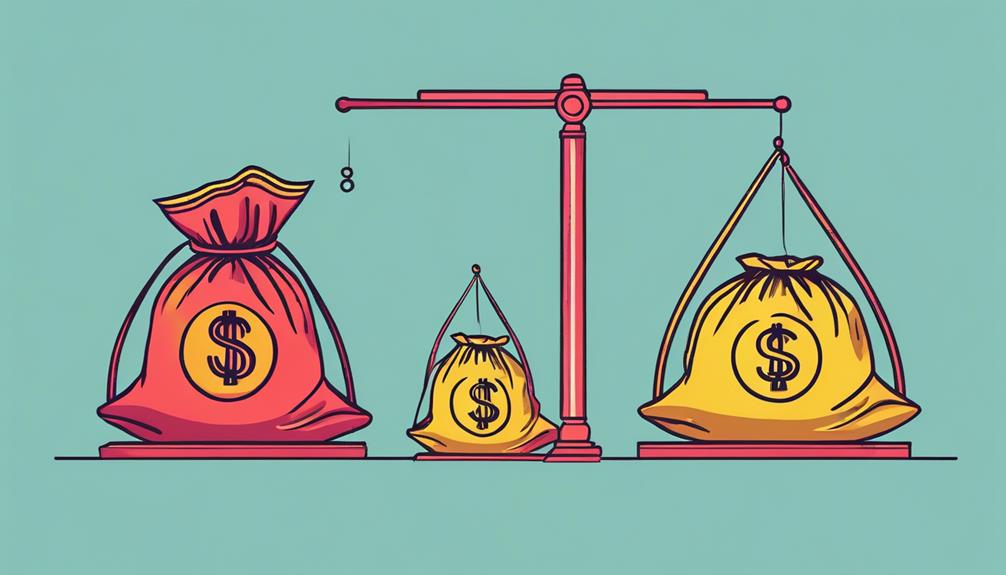In the realm of economic justice, the complexities of wealth distribution and opportunity allocation demand a strategic and comprehensive approach. By examining the structural inequities that underpin economic disparities and exploring avenues for systemic change, we can begin to unravel the intricate web of factors that perpetuate financial inequality. Through a critical lens, we must assess the efficacy of current policies, challenge existing norms, and envision innovative solutions to pave the way towards a more equitable economic landscape. Only by engaging in thoughtful dialogue and concerted action can we hope to navigate the path towards true economic justice.
Key Takeaways
- Implement progressive taxation to address income disparities.
- Promote equal opportunities in education and the workforce.
- Ensure fair wages, benefits, and access to essential services.
- Address systemic discrimination for equal pay and wealth distribution.
Defining Economic Justice

Defining Economic Justice entails the establishment of equitable economic systems grounded in moral and ethical principles. This concept revolves around ensuring equal opportunities and income equality for all individuals within society. By focusing on providing fair chances for employment, access to credit, and universal basic income, Economic Justice aims to bridge the gap between the wealthy and the disadvantaged. The core idea is to eliminate wealth disparity by creating a level playing field where everyone has the same prospects for success. In essence, Economic Justice seeks to create a society where individuals are not held back by their socio-economic backgrounds but are empowered to lead dignified and productive lives. By addressing income inequality and ensuring equal opportunities, Economic Justice strives to build a sustainable environment where basic needs are met, and all individuals have the chance to thrive without facing systemic barriers.
Root Causes of Economic Inequality
Economic inequality, stemming from various systemic factors such as unequal access to education and discriminatory labor market practices, remains a persistent challenge with far-reaching societal implications. This pervasive issue of income inequality is deeply intertwined with the pursuit of social justice. Several root causes contribute to the widening wealth gap and perpetuate economic disparities:
- Unequal Access to Education: Disparities in educational opportunities create barriers that hinder socio-economic mobility.
- Discrimination in the Labor Market: Biases in hiring, promotion, and pay processes marginalize certain groups and reinforce economic inequality.
- Regressive Tax Policies: Tax systems that disproportionately burden low-income individuals while favoring the wealthy exacerbate income disparities.
- Limited Social Mobility: Structural barriers impede individuals from moving up the economic ladder, entrenching generational poverty and wealth gaps.
Understanding these underlying causes is crucial in formulating effective strategies to address income inequality and advance towards a more equitable society.
Importance of Wealth Redistribution

Highlighting the necessity of equitable wealth redistribution in addressing income disparities and fostering economic justice underscores the imperative for societal transformation towards a more balanced financial landscape. Wealth redistribution plays a pivotal role in rectifying the vast income gaps prevalent in many societies. By implementing redistributive policies such as progressive taxation, where higher earners contribute a larger proportion of their income, wealth can be more evenly distributed among the population. This approach helps create a more level playing field, enabling individuals from all income brackets to access economic opportunities and resources fairly. Effective wealth redistribution not only reduces poverty levels but also enhances overall economic well-being by ensuring that wealth is circulated more equitably within the society. The United States' statistic that the top 1% of households hold about 40% of the nation's wealth underscores the urgency for implementing mechanisms that promote fair wealth distribution for the betterment of society.
| Importance of Wealth Redistribution |
|---|
| Addressing income disparities |
| Promoting economic justice |
| Implementing progressive taxation |
| Enhancing economic opportunities |
| Reducing poverty levels |
Role of Government Policies
Government policies play a crucial role in shaping economic justice by influencing income distribution and social welfare. Through policy impact assessments, governments can ensure that their legislation promotes equity and fairness in society. Examining the effectiveness and inclusivity of governmental interventions is essential for achieving a more just and equal economic system.
Policy Impact Assessment
Analyzing the impact of policies on economic justice is essential for evaluating the efficacy of governmental interventions in promoting equitable access to resources and income distribution.
- Data-driven Assessments: Utilizing empirical evidence to measure the effectiveness of policies in reducing income disparities.
- Intersectional Approach: Considering how policies affect various dimensions of identity, including gender, in promoting income equality.
- Stakeholder Consultation: Involving diverse groups in the assessment process to ensure policies address specific needs and challenges.
- Long-term Evaluation: Monitoring policy outcomes over time to assess sustained impacts on economic justice.
Equity in Legislation
In the pursuit of economic justice, the foundation of equitable societal frameworks rests significantly on the enactment of legislation that upholds principles of fairness and equality. Government policies, particularly those addressing progressive taxation and opportunity, play a crucial role in fostering economic equity. Through measures like progressive taxation, where tax rates increase as income rises, governments can redistribute wealth more equitably, reducing income disparities. Additionally, legislation promoting equal access to opportunities, such as education and employment, can help level the playing field for all individuals. By implementing policies that ensure fairness and inclusivity, governments can create a more just economic system that benefits society as a whole, addressing systemic barriers and promoting a more equal distribution of resources.
Promoting Equal Opportunities

Promoting equal opportunities is crucial for fostering a society where individuals have a fair chance at economic success. Education for all ensures that skills and knowledge are not limited by socio-economic constraints, while fair hiring practices guarantee that merit, not background, determines employment opportunities. Implementing equal pay standards is essential in bridging income disparities and creating a more just economic environment for all.
Education for All
Education for all plays a pivotal role in leveling the economic playing field by providing individuals with the essential skills and knowledge necessary to thrive in the competitive workforce.
- Breaking the Cycle: Access to quality education can break the cycle of poverty and inequality, enabling individuals to secure better-paying jobs and improve their economic status.
- Disparities Perpetuating Injustice: Disparities in educational opportunities can perpetuate economic injustice, especially in marginalized communities lacking resources like good schools and qualified teachers.
- Benefits of Investment: Investing in education leads to a more skilled workforce, increased productivity, and a stronger economy, benefiting society as a whole.
- Policy Solutions: Addressing educational inequities through funding for underserved schools and programs supporting disadvantaged students is essential for achieving economic justice.
Fair Hiring Practices
Education's power to shape opportunities extends beyond the classroom, influencing fair hiring practices that strive for equal opportunities in the workforce. Fair hiring practices are essential for promoting equal opportunity for employment, irrespective of gender and race. By implementing strategies like blind recruitment techniques, where demographic information is removed from resumes, unconscious biases can be minimized during the selection process. Additionally, providing diversity and inclusion training for hiring managers can enhance awareness and encourage a more equitable selection of candidates. Structured interview processes with standardized questions and evaluation criteria further help in reducing subjective decision-making in hiring. Ultimately, offering equal access to job opportunities, training, and career development programs plays a crucial role in creating a more inclusive and just workforce.
Equal Pay Standards
Equal pay standards are a fundamental component in ensuring equitable compensation for individuals performing similar roles, regardless of gender, race, or other distinguishing factors.
- Equal pay standards ensure that individuals receive equal pay for equal work regardless of gender, race, or other factors.
- The gender pay gap in the US is around 82 cents for every dollar a man earns, with even larger gaps for women of color.
- Promoting equal pay opportunities can help reduce poverty and enhance economic stability for marginalized groups.
- Implementing and enforcing equal pay standards is crucial for achieving economic justice and closing income disparities.
Addressing Systemic Discrimination

Systemic discrimination pervades various aspects of society, perpetuating stark economic disparities among marginalized groups. These disparities are evident in the significant wealth gap between Black and white households, where the average Black household possesses only a fraction of the wealth held by their white counterparts. In the labor market, discrimination results in Black Americans earning considerably less than their white counterparts, despite holding similar positions. Latinx workers also face obstacles in job advancement and fair wages due to discriminatory practices. Women, particularly women of color, experience a gender pay gap, earning substantially less than men. Moreover, discriminatory lending practices limit access to credit for minority populations, further entrenching economic inequalities. To address systemic discrimination, it is imperative to create opportunities for all members of society, ensuring that individuals are not disadvantaged based on their race, gender, or ethnicity. By fostering an inclusive and equitable environment, we can begin to dismantle systemic discrimination and work towards a more just and fair society.
Ensuring Fair Wages and Benefits
Fair wages and benefits are foundational pillars of economic justice, requiring a critical examination of existing standards and practices. Living wage standards play a crucial role in ensuring workers can meet their basic needs, while equal access to benefits such as healthcare and retirement savings is essential for fair compensation. By analyzing and advocating for these key aspects, we can strive towards a more equitable and just economic system.
Living Wage Standards
Living wage standards play a crucial role in ensuring that workers receive compensation that aligns with the basic necessities required to sustain a dignified standard of living.
- Living wage standards ensure that workers earn enough to meet basic needs like housing, food, and healthcare.
- The concept of living wage goes beyond minimum wage, taking into account the cost of living in a specific area.
- Living wage calculations vary by location, with some cities and states implementing policies to establish and enforce these standards.
- Research shows that living wages reduce poverty, improve worker productivity, and benefit local economies.
Equal Benefits Access
Access to equitable benefits is a cornerstone of fostering economic justice by ensuring that workers receive fair compensation for their contributions. Fair wages and benefits, including healthcare, paid leave, and retirement plans, are vital for economic stability and employee well-being. Addressing gender and racial disparities in benefits access is crucial to creating a more equitable workplace. Policies such as minimum wage laws and comprehensive benefits packages play a significant role in promoting economic justice by providing a safety net for workers. By ensuring equal benefits access, we not only create a more just society but also stimulate economic growth through increased consumer spending and productivity.
| Benefits Access | Importance |
|---|---|
| Healthcare | Ensures well-being |
| Paid Leave | Promotes work-life balance |
| Retirement Plans | Secures future financial needs |
Enhancing Access to Education

Ensuring equitable opportunities for educational advancement is paramount in the pursuit of economic justice, serving as a catalyst for empowerment and socioeconomic equality. Access to quality education plays a pivotal role in breaking the chains of economic disparity and fostering a more just society. To enhance access to education, the following strategies are crucial:
- Investments in Early Childhood Education: Early intervention can help bridge the gap in educational disparities from a young age, setting a strong foundation for future academic success.
- Affordable Higher Education: Making higher education more affordable can enable individuals from diverse socioeconomic backgrounds to access advanced learning opportunities and enhance their career prospects.
- Addressing School Funding Inequities: Ensuring that all schools receive adequate funding can help level the playing field and provide equal educational resources to students, irrespective of their location or economic status.
- Improving Educational Outcomes for Underserved Populations: Implementing targeted programs to support marginalized communities can help improve educational outcomes and empower individuals to break the cycle of poverty through education.
Supporting Minority-Owned Businesses
The promotion of economic justice necessitates robust support for minority-owned businesses to address systemic disparities and cultivate inclusive economic growth. Minority-owned businesses play a vital role in the economy, accounting for over 11 million U.S. firms and significantly contributing to job creation. However, these businesses often encounter obstacles in accessing credit, resources, and opportunities for expansion, hindering their full potential. By implementing initiatives such as mentorship programs, facilitating access to affordable loans, and providing procurement opportunities, minority entrepreneurs can be empowered to thrive. Supporting minority-owned businesses not only aids in reducing economic disparities but also fosters community development in underserved areas. Investing in these businesses is not just a matter of economic justice but also a strategic move towards enhancing overall economic resilience and diversity.
| Initiative | Impact | Benefits |
|---|---|---|
| Mentorship programs | Skill development and guidance | Enhanced business acumen |
| Access to affordable loans | Expansion opportunities | Improved financial stability |
| Procurement opportunities | Increased market presence | Enhanced employment prospects |
Strengthening Social Safety Nets

Strengthening social safety nets through enhancing welfare programs, increasing unemployment benefits, and improving healthcare accessibility is imperative in fostering economic justice. By bolstering these key pillars of support, societies can better shield vulnerable individuals from financial instability and reduce disparities in access to essential services. The effectiveness of social safety nets not only mitigates the immediate impacts of economic challenges but also contributes to long-term economic resilience and equality.
Enhancing Welfare Programs
In bolstering welfare programs such as Temporary Assistance for Needy Families (TANF), societies can significantly enhance financial support for vulnerable individuals and families, fostering economic stability and resilience.
- Expanding Medicaid coverage to ensure healthcare access for low-income populations.
- Enhancing unemployment benefits and job training programs for smoother job transitions.
- Investing in affordable housing initiatives to combat housing insecurity.
- Improving access to food assistance programs like SNAP to alleviate food insecurity.
Increasing Unemployment Benefits
Enhancing the financial safety net through increased unemployment benefits provides crucial support for individuals facing job loss and strengthens economic resilience within communities. By bolstering unemployment benefits, we can mitigate the financial strain experienced by those who lose their jobs, ultimately contributing to a more just economic system. Research indicates that higher unemployment benefits play a significant role in reducing poverty levels and preventing individuals from slipping into financial turmoil during challenging economic periods. Moreover, improved economic stability resulting from enhanced unemployment benefits allows families to meet their basic needs and sustain their livelihoods. This underscores the importance of prioritizing unemployment benefits as a key component of achieving economic justice and fostering a more equitable society where individuals have the necessary support during times of need.
Improving Healthcare Accessibility
Improving access to healthcare services is a fundamental aspect of bolstering social safety nets and advancing economic justice for all individuals in society.
- Strengthening social safety nets can improve healthcare accessibility for marginalized communities.
- Access to quality healthcare services is crucial for achieving economic justice and reducing health disparities.
- Developing policies that ensure affordable healthcare for all promotes a more equitable society.
- Investing in community health centers and expanding Medicaid coverage can enhance healthcare access.
These initiatives align with the principles of economic justice by providing essential healthcare services to all individuals, irrespective of their income level. Policies like universal basic income and the earned income tax credit (EITC) can further support healthcare accessibility, contributing to a fairer and more inclusive society.
Advocating for Progressive Taxation

Advocating for the implementation of progressive taxation is imperative in addressing income inequality and promoting economic justice in society. Progressive taxation involves higher tax rates for those with higher incomes, aiming to redistribute wealth by taxing the wealthy more than lower-income individuals. This system helps fund social programs and services that benefit the disadvantaged, promoting a fairer distribution of wealth and opportunities. By taxing the wealthy proportionally more, progressive taxation can help bridge the wealth gap and promote economic justice.
| Advantages of Progressive Taxation |
|---|
| Reduces income inequality |
| Funds social programs |
| Promotes fair wealth distribution |
Fostering Financial Inclusion
In the realm of economic development, fostering financial inclusion stands as a paramount initiative in ensuring equitable access to essential financial services for underserved populations. Financial inclusion aims to provide access to affordable financial services like savings, credit, insurance, and payments to individuals who are often excluded from traditional banking systems. Here are key points to consider in fostering financial inclusion:
- Over 1.7 billion adults worldwide remain unbanked, limiting their ability to save, invest, and secure their financial future.
- Promoting financial inclusion can boost economic growth, reduce poverty, and enhance overall social well-being.
- Digital financial services play a crucial role in expanding financial inclusion by reaching remote areas and marginalized communities.
- Initiatives like microfinance, mobile banking, and financial literacy programs help bridge the gap and promote economic justice through financial inclusion.
Empowering Marginalized Communities

Empowering marginalized communities requires a comprehensive approach that addresses systemic inequalities and provides targeted support to facilitate economic upliftment. Marginalized groups, facing barriers like racial discrimination in employment, housing, and financial services, struggle to access resources and opportunities essential for economic success. To combat this, initiatives such as job training programs, affordable housing projects, and increased access to capital are crucial for leveling the playing field. Additionally, investments in education, healthcare, and community development within marginalized areas can foster a more equitable economic landscape by enhancing the skills and well-being of community members. Collaboration with community leaders and organizations is integral to amplifying the voices of marginalized communities and ensuring that their needs and perspectives are at the forefront of efforts towards economic justice. By addressing these issues head-on and providing targeted support, we can empower marginalized communities to overcome systemic challenges and strive towards a more just and inclusive society.
Monitoring and Evaluating Impact
To ensure the effectiveness and impact of economic justice initiatives, it is imperative to rigorously monitor and evaluate their outcomes, focusing on key indicators such as income distribution, wealth disparities, and access to resources. Monitoring and evaluating impact involve tracking the outcomes of economic justice initiatives to assess their effectiveness accurately. Data points such as income distribution, wealth gaps, and access to resources are crucial for evaluating the impact of economic justice efforts. Regular assessments can help identify areas of success and areas needing improvement in achieving economic justice goals. Monitoring can reveal disparities in economic outcomes based on factors like race, gender, and socioeconomic status. Evaluating impact enables organizations to make data-driven decisions for enhancing economic justice strategies and addressing community needs effectively.
- Tracking outcomes of economic justice initiatives
- Assessing effectiveness through key indicators
- Identifying areas of success and improvement
- Addressing disparities in economic outcomes.
Frequently Asked Questions
How Do You Achieve Economic Justice?
Achieving economic justice necessitates addressing income inequality through policy reform. By redistributing wealth and emphasizing social impact, a more equitable economic landscape can be fostered. Implementing progressive taxation systems, expanding programs like earned income tax credit, ensuring fair wages, and creating equal employment opportunities are pivotal steps. Elevating wages for lower-income groups and regulating executive salaries can bridge the wealth gap and advance economic justice initiatives.
What Are Some Examples of Economic Justice?
Examples of economic justice include ensuring fair wealth distribution through equitable taxation policies and promoting fair wages to address income disparities. Additionally, providing equal opportunities for all individuals, implementing poverty alleviation programs, and advocating for policies that prioritize education and healthcare access contribute to economic justice initiatives. By focusing on these areas, societies can strive towards a more just economic system that benefits all members.
How Is Justice Achieved in Society?
Justice in society is achieved through the establishment and enforcement of just laws and regulations that uphold fairness, equality, and protection of individual rights. This involves the functioning of justice systems, adherence to societal norms, and the promotion of ethical practices. By ensuring accountability, transparency, and impartiality, justice systems can contribute to a harmonious and orderly society where individuals are treated equitably and have access to legal recourse when their rights are violated.
How to Advance Social and Economic Justice?
Promoting equality and fair wages is paramount in advancing social and economic justice. By advocating for policies that prioritize equitable distribution of resources and opportunities, such as implementing Universal Basic Income and extending Earned Income Tax Credit coverage, we can work towards a more just society. Collaboration with diverse stakeholders and analyzing data to drive equitable economic development are essential components in creating a more inclusive and fair economic landscape.
Conclusion
In conclusion, achieving economic justice requires a comprehensive approach that addresses root causes of inequality, promotes wealth redistribution, and advocates for government policies that support equal opportunities. By fostering financial inclusion, empowering marginalized communities, and monitoring impact, we can work towards creating a more equitable society. Like a well-oiled machine, these efforts must work together to ensure a fair and just economic system for all individuals.
